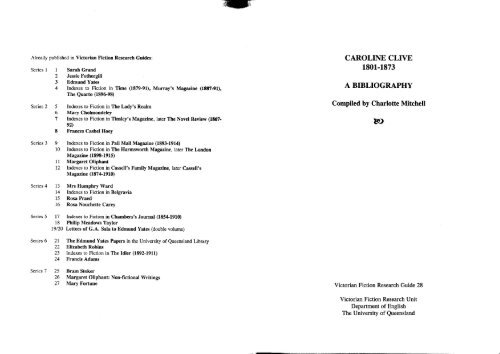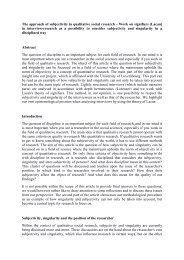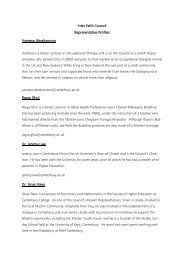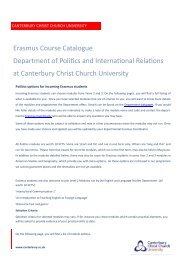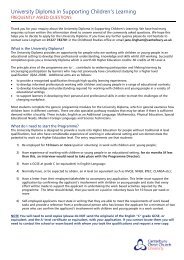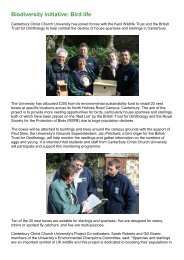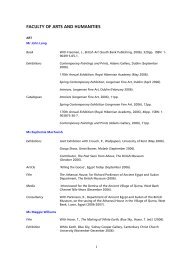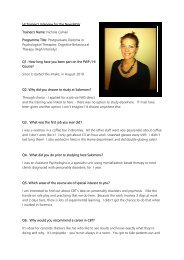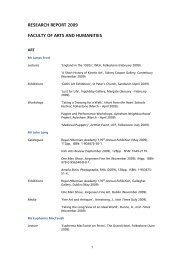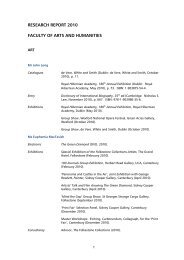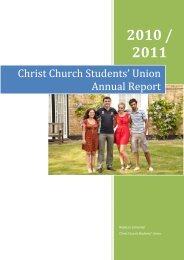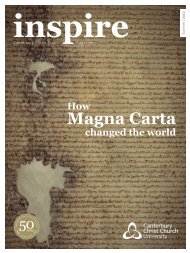seri$ I I sslsh G".nd - Canterbury Christ Church University
seri$ I I sslsh G".nd - Canterbury Christ Church University
seri$ I I sslsh G".nd - Canterbury Christ Church University
Create successful ePaper yourself
Turn your PDF publications into a flip-book with our unique Google optimized e-Paper software.
Alrcady published in viclodaD <strong>nd</strong>or Re!€.ftb cuider: CAROLINE CLM<br />
<strong>seri$</strong> I I <strong>sslsh</strong> G".<strong>nd</strong><br />
1E0r_1973<br />
2 Jesie Fotheirill<br />
3 Edmu<strong>nd</strong> Yat€€<br />
4 lld.res to Fictid in rine (lsze-er), Mrr.y,r Mis.,i (rEE74l),<br />
Thc Quarto (1896-98)<br />
seriq 2 5 r<strong>nd</strong>crcs ro Fictid hrhe r,sdy,s R€otm<br />
6 Mart Cholmo<strong>nd</strong>eley<br />
7 Itrd.,t* io Ficrion h lbsleyk Mrgad$, l,r€I The Noycl RGd.r (r$t<br />
92')<br />
E Fr3lB CahdHory<br />
S€rie! 3 9 I<strong>nd</strong>Ex$ io Fiction in Pau MrI Mrggire (1E9U914)<br />
10 ID&rs to FictioD in Tb. Hrlmrworrh Magarin€, latd Tt Llldon<br />
Masdre (1898-r9rt<br />
1l Mrrgarct Onphsd<br />
12 Lrdcrcs to Fictid h Crss€lt fanlly Mr$riDe, lttc. C.!r.ll's<br />
Mryarhc (ff41910)<br />
Series 4 13 Mr6 Humphry Wrrd<br />
14 I<strong>nd</strong>er.q to Fidiotr ir BelgaYia<br />
15 Rola Prr€d<br />
16 RoEa Nouch€{te Crr€y<br />
Series 5 17 I<strong>nd</strong>qes to FictioD in Chmb€.s" JoUInrl O8*r910)<br />
18 Philip Meadors Tryln<br />
19/20 I4tterE of G,A. SrIr to EdDEd Yrtls (double volune)<br />
Series 6 2l TIle f,dmu<strong>nd</strong> Ysaes P.p.n in tte Univcrsity of Quffildd Libnry<br />
22 Elizrb€lh RobiG<br />
23 I<strong>nd</strong>ets io Fiction in The Idl€r (1E92-1911)<br />
24 FYmd. AdMs<br />
A BIBLIOGRAPIfI<br />
Compiled by Charloite Mitchell<br />
Series 7 25 Bram Stoker<br />
26 Margaret Oliphant: Non-fictional Writings<br />
27 Mary Fortune Victorian Fiction Research Guide 28<br />
fA)<br />
Victorian Fiction Research Unit<br />
Department of English<br />
The <strong>University</strong> of Queensla<strong>nd</strong>
Copyright @ Charlotte Mitchell 1999<br />
ISBN 1-86499-t194<br />
ISSN 0158 3921<br />
Published by<br />
Victorian Fiction Research Unit<br />
Department of English<br />
The <strong>University</strong> of Queensla<strong>nd</strong><br />
Australia 4072<br />
VICTORIAN FICTION RESEARCH GUIDES<br />
Victorian Fiction Research Guides are published by the Victorian<br />
Fiction Research Unit within the Department of English, The <strong>University</strong><br />
of Queensla<strong>nd</strong>.<br />
The Unit concentrales on minor or lesser-known writers active during<br />
the period from about 1860 to about 1910, a<strong>nd</strong> on fiction published in<br />
journals during the same period. We would be interested to hear from<br />
anyone working on relevant author-bibliographies or on i<strong>nd</strong>exes to<br />
fiction in journals of ttre period. Any information about the location of<br />
manuscripts, rare or unrecorded editions, a<strong>nd</strong> other material would be<br />
most welcome. Information about gaps or errors in our bibliographies<br />
a<strong>nd</strong> i<strong>nd</strong>exes would also be appreciated.<br />
The subscription for the current (seventh) series of Victorian Fiction<br />
Research Guides is $40 (Ausnalian) for four Guides; single volumes<br />
$A12. Copies of earlier Guides are available at the following prices:<br />
Series 1, 2,3,4,5: $A25 (single volumes $A7); Series 6: $A35 (single<br />
volumes $A10).<br />
Orders should be sent to Dr Barbara Garlick a<strong>nd</strong> editorial<br />
communications to the general editor, Professor Peter Edwards, both at<br />
the Department of English, The <strong>University</strong> of Queensla<strong>nd</strong>, Australia<br />
4O72: fax: 7 -3365-2799; email: b.garlick@mailbox.uq.edu.au.
Caroline Clive in about 1860<br />
Introduction<br />
CONTENTS<br />
Primary Bibliography<br />
Non-fiction<br />
Verse<br />
Fiction<br />
Contributions to periodicals a<strong>nd</strong> anthologies<br />
Translation<br />
Diary<br />
Microfilm edition<br />
Manuscripts<br />
Seco<strong>nd</strong>ary Bibliography<br />
Obituaries<br />
Contemporary Reviews<br />
Other References by Contemporaries<br />
Later Criticism<br />
Thesis<br />
Reference Works<br />
Brief References<br />
lll<br />
29<br />
30<br />
30<br />
32<br />
36<br />
37<br />
38<br />
38<br />
38<br />
4L<br />
4t<br />
4I<br />
45<br />
47<br />
48<br />
48<br />
49
,<br />
a/rt /" 1o--' 7p',//.^ /o-"1 .,<br />
/a./.,i'-ofr /"r "-/J;q<br />
dt^. e" rl<br />
/r4"<br />
/1*/ ,7,<br />
,h lr'.Lnn (o-.c 2<br />
PAUI FBRROI,L<br />
&aIt<br />
BI<br />
'TIII' AUTIIOIT OI'"IX. PODTTS BY<br />
" llot littlc wc know of $hn( nNrcc ir cml ollcr! mi<strong>nd</strong>s,"<br />
lDrtr SfITr(d Ltrriftd.<br />
Jourtt itrElitior,<br />
IYITII A CONCLUDINC IfOTIUII.<br />
'ONDON:<br />
s,ruNDnRS ltND OTtrry, coNl)ul'f sTnI'nT.<br />
&
INTRODUCTION<br />
Mrs Cayhill, in Henry Ha<strong>nd</strong>el Richardson's first novel Maurice Guest (1908),<br />
is an i<strong>nd</strong>olent American who uses fiction as a drug, happy to settle in l-eipzig<br />
because of its "circulating library rich in English novels". Maurice himself<br />
appeases her with tribute of "old Taucbnitz volumes". One of the novels Mrs<br />
Cayhill reads "like a tippler in the company of his bottle" is Caroline Clive's<br />
third novel, Why Paul Ferroll Killed His Wife (1860); she fi<strong>nd</strong>s it, Richardson<br />
says, "dry reading".l No doubt she had the Tauchnitz edition, published in<br />
Leipzig in 1861, one of the little cream paper-covered Collection of British<br />
Authors Series which entertained generations of English-speaking travellers on<br />
the continent of Europe during the railway age.<br />
One would like to know what Richardson expected her readers to<br />
u<strong>nd</strong>ersta<strong>nd</strong> by this reference; whether, for example, she assumed that some of<br />
them would be aware that the novel a<strong>nd</strong> its predecessor, Paul Fenoll (1855),<br />
are, like Maarice Guest itself, studies of a triangular sexual passion, treated<br />
with more detachment a<strong>nd</strong> more emphasis on sexual violence than<br />
contemporary audiences expected from novels by women. Perhaps she simply<br />
took the title because it contrasted nicely with Mrs Cayhill's lazy a<strong>nd</strong><br />
unreflecting personality, so as to emphasize how an appetite for novels may<br />
coexist with an absolute lack of interest in art a<strong>nd</strong> ideas a<strong>nd</strong> an i<strong>nd</strong>ifference to<br />
the human personalities which surrou<strong>nd</strong> one. That Mrs Cayhill is an<br />
u<strong>nd</strong>iscriminating reader is suggested by the heterogeneous list of other novels<br />
she reads:<br />
Shadowed by Three, a most delightful Book. On Friday, Richard<br />
Elsmere, a<strong>nd</strong>-oh yes, I know, it was about a farm, an Australian farm<br />
... a nice book, but a little coarse in parts, a<strong>nd</strong> very foolish at the e<strong>nd</strong>.2<br />
The Story of an African Farm (1883) arfi Roben Elsmere (1888), so<br />
controversial in their day, are reduced to fictional fodder for Mrs Cayhill,<br />
down at the level of. Shadowed by Three (1884), a forgoffen detective story by<br />
Emma M. Murdoch. To those intrigued by the dense u<strong>nd</strong>ergrowth of Victorian<br />
fiction, this picture of Mrs Cayhill i<strong>nd</strong>ulging herself with the Leipzig<br />
circulating library offers tantalizing possibilities. Richardson is interested in<br />
the ironies thrown up by the sordid lives of dedicated artists; no doubt she also<br />
remembers that her own novel may meet an obscure fate like that of those titles<br />
she plays with. In another irony, the unpredictable fashions of twentieth-
2<br />
century literary history have belatedly canonized Richardson in the namo of<br />
"Australian literature" a<strong>nd</strong> *women's writing". They have also brought somo<br />
revival of interest n W Paul Ferroll Killed His Wife a<strong>nd</strong>, in its author, an<br />
interesting personality a<strong>nd</strong> a notable diarist, the disabled wife of a rich<br />
Victorian clergyman, author of meditative verse a<strong>nd</strong> sardonic, intermittently<br />
impressive novels which shocked a<strong>nd</strong> impressed her contemporaries.<br />
$$$$$0$$$$$$<br />
The author of Paul Fenoll was born on 30 June 1801 at Brompton Grove, a<br />
now demolished Georgian terrace in the Brompton Road some hu<strong>nd</strong>red yards<br />
west of the present site of Harrods,3 then a pleasant suburban area. She was the<br />
seco<strong>nd</strong> daughter a<strong>nd</strong> third child of a barrister a<strong>nd</strong>, from 1789 to 1802, Whig<br />
M.P., Edmu<strong>nd</strong> Wigley (1758-1821) a<strong>nd</strong> his wife, Anna Maria Meysey (1770-<br />
1836). Her mother had inherited the ancient Meysey estate of Shakenhurst,<br />
near Cleobury Mortimer, on the Shropshire/Worcestershire border. When<br />
Caroline was about ten Edmu<strong>nd</strong> Wigley changed his surname to Meysey<br />
Wigley; soon afterwards he retired from legal practice a<strong>nd</strong> settled at<br />
Shakenhurst, a country house to which he a<strong>nd</strong> Anna Maria had addcd, in 1798,<br />
soon after their marriage, a red-brick classical facadc in the latest modcrn<br />
fashion.<br />
The Wigleys had five children, Anna, Edmu<strong>nd</strong>, Caroline, Mary r<strong>nd</strong><br />
Meysey, a<strong>nd</strong> seem to have been a happy, prosperous a<strong>nd</strong> united family,'<br />
However, when Caroline was two she contracted a severe illness with a high<br />
fever (perhaps infantile poliomyelitis). She recovered, but both legs worc<br />
partly paralysed, a<strong>nd</strong> she never walked without a stick. Her younger sister,<br />
describing her own childhood in idyllic terms, remembered that the ha<strong>nd</strong>icap<br />
seemed to affect Caroline more as she grew older:<br />
... though her strong mi<strong>nd</strong> & high spirits canied her through childhood<br />
with the same feelings as the rest her privations told as she grew up &<br />
she felt sharply the loss of all the active pleasures in which all her<br />
companions revelled.5<br />
Her consciousness of being crippled was later deeply to affect her writing; it is<br />
also likely that her enthusiasm for literary pursuits was encouraged by her<br />
enforced passivity. A diary of hers which survives for the year 1815 i<strong>nd</strong>icates<br />
that she was learning music, drawing, French, Latin, Greek, history,<br />
geography, mathematics, a<strong>nd</strong> possibly also German; a<strong>nd</strong> the attempts at verse<br />
a<strong>nd</strong> passages of flowery moralizing which she has copied into it speak<br />
eloquently of adolescent intellectual aspiration.6 Scribbled at the front are the<br />
words:<br />
Swift says "that after all her boasted acquirements Woman will generally<br />
speaking be fou<strong>nd</strong> to profess less of what is called learning than a<br />
common school-boy["] Alas! Alas! Alas! Alas! Alas! Alas! Alas! Alas!<br />
Alas!<br />
During Caroline's childhood the Wigley family lived betrveen Lo<strong>nd</strong>on<br />
a<strong>nd</strong> Worcestershire. They had a house in Sackville Street, off Piccadilly, until<br />
about 1813, a<strong>nd</strong> used to spe<strong>nd</strong> some time each year at Shakenhurst, which was<br />
three days'journey from Lo<strong>nd</strong>on. They seem also to have kept a house at<br />
Richmo<strong>nd</strong>, from where one could visit Lo<strong>nd</strong>on a<strong>nd</strong> return within the day, but<br />
to which they used to go a<strong>nd</strong> stay for a week or so. After the move to the<br />
country there were occasional visits to Lo<strong>nd</strong>on or Cheltenham, a<strong>nd</strong> a tour of<br />
Scotla<strong>nd</strong> in 1815. They had a house in Cumberla<strong>nd</strong> Square in Lo<strong>nd</strong>on in 1819.<br />
It was probably at about this time that Caroline developed an attachment,<br />
remembered later with embarrassment, to the novelist Catherine Gore (1799-<br />
1861):<br />
... she was a gay Lo<strong>nd</strong>on y[oun]g lady & very ki<strong>nd</strong> to me in my<br />
chrysalis state ... I used to fall into the most viol[en]t frie<strong>nd</strong>ships & the<br />
one I felt for her was n[ea]rly the str[on]gest of my pass[ion]s. Of<br />
course she did not return it, to an ugly, awkward, half taught,<br />
unintelligible girl like me ...7<br />
In 1821 Edmu<strong>nd</strong> Meysey Wigley died leaving his widow a<strong>nd</strong> three<br />
unmarried daughters of 24, 20 a<strong>nd</strong> 19 living together in genteel comfort.<br />
Edmu<strong>nd</strong>, 23, was already in the army; Meysey, 18, was to be a clergyman.<br />
Anna, the eldest daughter, was attached to a family frie<strong>nd</strong>, John Severne,<br />
whom she married in 1825. Caroline a<strong>nd</strong> Mary, who would inherit some<br />
money, were naturally expected to marry likewise. But Caroline was<br />
ha<strong>nd</strong>icapped by a plain face a<strong>nd</strong> crippled legs a<strong>nd</strong>, besides, had immortal<br />
yearnings. The literary critic Isaac D'Israeli (1766-1848) wrote to her in 1823,<br />
answering an impassioned letter about her aspirations which she had written<br />
u<strong>nd</strong>er a male pseudonym:<br />
I have offered you at your desire such advice as I should give my Son;<br />
but I own I should be uneasy that my son should suffer such a feverish<br />
irritability after... a Poet's name, as you evidently do. Your personal<br />
happiness is too deeply involved in your writing.
4<br />
In 1827 she addressed a similar lener, with samples of her poetry, to the<br />
philosopher Dugald Stewart (1753-1828), whose wife replied in frie<strong>nd</strong>lier<br />
terms. She also published u<strong>nd</strong>er an assumed name, a<strong>nd</strong> no doubt at her own<br />
expense, a volume of theological essays which seems to have been greeted with<br />
absolute i<strong>nd</strong>ifference by an ungrateful public.<br />
In 1829 the Meysey Wigleys were delighted to hear that a distant a<strong>nd</strong><br />
childless cousin on their father's side had died, leaving a large estate, Malvern<br />
Hall, Solihull, near Birmingham, a<strong>nd</strong> a ha<strong>nd</strong>some fortune (more than f8000 a<br />
year) to Caroline's brother Edmu<strong>nd</strong>, who was to change his surname to<br />
Greswolde. Caroline seems to have u<strong>nd</strong>ertaken the office of lady of the houee<br />
for him (he remained in the army a<strong>nd</strong> was often absent with his regimcnt),<br />
while also visiting her mother a<strong>nd</strong> sister.<br />
However, this piece of good forhrne was followed by uncxpcctcd<br />
disasters. First of all her younger brother, the Rev. Mcysey Meysey Wigley,<br />
died as a result of an accident in the house in 1830. Then Edmu<strong>nd</strong>, who seems<br />
to have been close to Caroline, also died young in especially distressing<br />
circumstances. As was not unusual among the English la<strong>nd</strong>ed class, the<br />
Malvern estate was entailed; Edmu<strong>nd</strong> had, that is, a life interest in the estatc<br />
which was held by trustees for the benefit of the family's male heirs. Wishing<br />
to raise a large sum of money to buy himself a colonelcy, he borrowed it<br />
against the security of insurance policies taken out with several different<br />
companies. As he was a young man in apparently good health, with a largc<br />
income a<strong>nd</strong> no depe<strong>nd</strong>ants, there seemed nothing especially imprudent in this<br />
step. Unfortunately, however, Edmu<strong>nd</strong> was one of the victims of the first<br />
European cholera epidemic (he died with his regiment in Irela<strong>nd</strong> in January<br />
1833). The insurance companies refused to pay up, claiming that Edmu<strong>nd</strong> was<br />
an alcoholic a<strong>nd</strong> an epileptic. It is hard to determine the rights a<strong>nd</strong> wrongs of<br />
this issue, which led to a prolonged a<strong>nd</strong> inconclusive legal battle, but Caroline<br />
a<strong>nd</strong> her sisters were convinced of Edmu<strong>nd</strong>'s innocence a<strong>nd</strong> the wickedness of<br />
the insurance companies. She was later to use the experience in her seco<strong>nd</strong><br />
novel, Year after Year (1858).<br />
As a result of Edmu<strong>nd</strong>'s death, Caroline left Malvern, which was<br />
inherited by their uncle Henry Wigley (who changed his name to Greswolde),<br />
a<strong>nd</strong> she moved to Olton Hall nearby, a house of some antiquity which had also<br />
come to the family by inheritance. She spent her time between there a<strong>nd</strong> her<br />
mother's house. The latter's death in 1836 (which had followed Mary's<br />
marriage in 1834) left her living full+ime at Olton. In the division of assets<br />
between the three sisters, Mary a<strong>nd</strong> her husba<strong>nd</strong> Charles Wicksted took the<br />
estate at Shakenhurst a<strong>nd</strong> Anna a<strong>nd</strong> Caroline other property, which amounted<br />
to approximately f75,000 each. Caroline was thus extremely well-off, but<br />
rather lacking in obvious duties a<strong>nd</strong> occupations. She solaced her loneliness<br />
a<strong>nd</strong> filled her leisure partly with literary pursuits, a<strong>nd</strong> partly with an increasing<br />
obsession with her closest frie<strong>nd</strong>, the Rector of Solihull, the Rev. Archer Clive<br />
(1800-1878). Like him she engaged in charitable work in the neighbourhood<br />
a<strong>nd</strong> was interested in the new Poor Law. She also held office as a Surveyor of<br />
Highways. He was frie<strong>nd</strong>ly to Caroline (she was already showing him her<br />
manuscripts before Edmu<strong>nd</strong>'s death) but wanted to marry a much younger a<strong>nd</strong><br />
prettier woman, Georgiana Duff Gordon (c1815-1906), whose mother was<br />
keener on his suit than she herself, a<strong>nd</strong> who finally refused him in February<br />
1839.8 After this experience he seems to have turned increasingly to Caroline.<br />
She discussed with him her reading a<strong>nd</strong> her compositions-for she was still<br />
writing poetry. In May 1840 he brought from Lo<strong>nd</strong>on for her the first copies<br />
of her first volume of verse, N Poems fo V. In the summer of that year they<br />
read the first complimentary reviews a<strong>nd</strong> planned a holiday together in<br />
Germany. Soon after their return in September he proposed marriage to her,<br />
a<strong>nd</strong> they were married at Bayton <strong>Church</strong>, near Shakenhurst, on l0 November.<br />
Thus in a very short space of time she obtained, aged 39, belatedly,<br />
unexpectedly a<strong>nd</strong> to her great delight, a measure of public recognition of her<br />
literary work, the companionship of the man she loved a<strong>nd</strong> the status of a<br />
married woman. This was followed by the birth of a son in January 1842 a<strong>nd</strong> a<br />
daughter in October 1843. Nor did she fi<strong>nd</strong> that these longed-for pleasures<br />
turned to ashes. Her children proved healthy a<strong>nd</strong> beloved; she continued to<br />
idolize her congenial husba<strong>nd</strong>; her small literary success gave her enonnous<br />
satisfaction. In Solihull Rectory, to which she moved after her marriage, she<br />
published two more slim volumes of verse, a story rn Blachuood's a<strong>nd</strong> a satire<br />
on the Oxford Movement. None of these made a gte t noise in the world,<br />
though there were some respectful reviews.<br />
In 1845 their prosperity was further enhanced by the successive deaths<br />
of Archer's elder brother a<strong>nd</strong> his father. From their comfortable rectory in<br />
Warwickshire they moved to Whitfield, near Hereford, a<strong>nd</strong> they became<br />
people of consequence in society. Archer Clive gave up his parish a<strong>nd</strong> lived<br />
the life of a country squire; they had a house in Lo<strong>nd</strong>on as well as a large<br />
country house, a<strong>nd</strong> in both places they entertained more people more often a<strong>nd</strong><br />
more lavishly. Caroline's pronounced taste for literary life was given scope,<br />
a<strong>nd</strong> she cultivated the acquaintance of a number of the celebrities of the day. In<br />
1853 the Clives left Engla<strong>nd</strong> for sixteen months on the Continent while their<br />
house was enlarged, spe<strong>nd</strong>ing the winter in Rome with their two children. The<br />
year after their return Caroline published her first novel, Paul Ferroll, which<br />
made something of a sensation. In 1856 they visited Paris a<strong>nd</strong> she enjoyed a<br />
taste of fame. Her poems were republished, a<strong>nd</strong> a new career seemed about to<br />
open to her as a novelist. In March 1857 she wrote in her diary:<br />
5
6<br />
I thtinlk the past winter has been the happiest time, the culminat[in]g<br />
point of my life. Not that I expect any misfornrnes, but it has been high<br />
Tide-Personally I have enjoyed Life, reading interest[in]g books, &<br />
writing freely-I have given m[ysellf over to Comfort-wheeling about<br />
the house in a chair-not riding; therefore being neither cold tircd nor<br />
afraid.<br />
But advancing age a<strong>nd</strong> successive falls a<strong>nd</strong> strokes inexorably limited<br />
her mobility a<strong>nd</strong> probably prevented her from taking full advantage of the<br />
success of her first novel. Though she published three mote, Year afier Year<br />
(1858), Wy Paul Ferroll Killed his Wik Q860), md John Greswold (1864),<br />
reviewers made it clear (a<strong>nd</strong> a modern reader may well agree) that the promise<br />
of the first was not completely fulfilled. An accident in July 1860 paralysed<br />
her completely at first, a<strong>nd</strong> her legs were almost useless afterwards. In 1865<br />
she had a seizure at the foot of the Alps while on a journey to spe<strong>nd</strong> another<br />
winter in Rome. She recovered the use of one ha<strong>nd</strong>, though her ha<strong>nd</strong>writing<br />
from this point is very shaky, a<strong>nd</strong> her voice was permanently affected. After<br />
this stre never wrote anything more which was published, but she continued to<br />
correspo<strong>nd</strong> with frie<strong>nd</strong>s, a<strong>nd</strong> she supervised the selection of her Poems (1872),<br />
In the late afternoon of 12 July 1873 she was sining in this helpless state<br />
by the fire in the library at Whitfield, surrou<strong>nd</strong>ed by newspapers, when a spark<br />
caught her dress; by the time the footman answered her feeble ring at the bell,<br />
she was enveloped in flame. He beat out the fire with cushions, but she had<br />
been badly burned a<strong>nd</strong> soon sank into a coma, dying at 5 p.m. the following<br />
day.n<br />
$$$$$$$$$$$s<br />
Though she lived more than three score years a<strong>nd</strong> ten, Caroline Clive's career<br />
as a published writer was thus not a long one: she began late a<strong>nd</strong> her career<br />
was cut short. Between 1840 a<strong>nd</strong> 1864 she published with some frequency a<strong>nd</strong><br />
experimented with a considerable variety of literary forms. Rougily speaking,<br />
she began with verse a<strong>nd</strong> moved on to prose, a<strong>nd</strong> on the whole her most<br />
considerable achievements are in prose. Her work in various gerues, however,<br />
does exhibit cornmon features. There are similarities of theme-she is<br />
preoccupied with tension, transience, foreboding, violence a<strong>nd</strong> death-a<strong>nd</strong><br />
there are stylistic similarities-she loves clarity, precision, irony, the morbid<br />
a<strong>nd</strong> the fantastic.<br />
In the spring of 1840 Caroline Meysey Wigley published her first book,<br />
a small thin volume of verse entitled IX Poems. Like most women writers at<br />
this period, she refrained from putting her name on the title page, but signed<br />
the title page "V.", short for "Vigolina', a nickname given her by Archer<br />
Clive. Review copies were sent out, a<strong>nd</strong> she soon received a letter, dated 12<br />
June 1840, from John Gibson Lockhart, the editor of the Quanerly Revi*v,<br />
which afforded her u<strong>nd</strong>ying pleasure:<br />
It is impossible to read the verses of V without being deeply impressed<br />
with his talents, & accomplishments[.] I regret that this No of the<br />
Quarterly Review had been made up before yr little volume reached a<strong>nd</strong><br />
take the liberty, in the view of noticing it next time if possible, of asking<br />
whether you have not published some work of more considerable bulk or<br />
meditate doing so soon[.]to<br />
This was followed by an enthusiastic review in the September issue<br />
which was part of Henry Nelson Coleridge's article on "Modern English<br />
Poetesses", a<strong>nd</strong> which was often referred to by later critics of Clive's work.<br />
He quotes her poem "The Grave", which, probably as a direct result, became<br />
much the best-known of her poems. Terseness a<strong>nd</strong> masculine clarity of thought<br />
were detected by Coleridge a<strong>nd</strong> by subsequent critics, such as Thackeray's<br />
frie<strong>nd</strong> Dr John Brown, an Edinburgh physician a<strong>nd</strong> belleslettrist, whose oncepopular<br />
volume ofessays Horae Subsecivae (1858) includes a rapturous review<br />
of IX Poems which he had first published in 1849. But, in spite of this, neither<br />
a seco<strong>nd</strong> edition, with additions, of IX Poems, nor the longer, melancholy a<strong>nd</strong><br />
reflective narrative poems which followed it-/ Watched the Heavens (L842),<br />
The Valley of the Rea (1851), The Morlas (1853)-achieved as much<br />
recognition as had that first thin little book. She also published two occasional<br />
poems, The Queen's Ball (1847), a grim comedy in octosyllabic couplets based<br />
on a frie<strong>nd</strong>'s story that invitations to a court ball had been sent to 150 dead<br />
people; a<strong>nd</strong> The Glass-berg (1851), a blank verse celebration of the Great<br />
Exhibition in the Crystal Palace.<br />
In l85l Clive recorded in her diary a meeting with the travel writer a<strong>nd</strong><br />
historian Eliot Warburton, who "said such fine things about my poetry that I<br />
was quite astonished. It seemed to me to have so entirely passed out of every<br />
bodys head."rr She made one more attempt to impress the public with a long<br />
poem, also in octosyllabic couplets. In a preface to The Morlns she declared<br />
that she had been working on the poem for many years, a<strong>nd</strong> had had it<br />
corrected by "one of the ablest pencils of the day"(probably that wielded by<br />
Caroline Norton, 1808-1877):<br />
I improved it as far as I was able according to those criticisms, a<strong>nd</strong> now<br />
I feel justified in offering it to the world as the best I can do; which if it<br />
fails to please, fails through want of ability, not for want of pains.<br />
7
8<br />
The narrator of the poem, resting in a clearing in a forest, hears the voice of<br />
the spirit of the valley, speaking of the change of history, the progress of man<br />
towards enlightenment, the inevitability of the natural cycle of lovc a<strong>nd</strong> death,<br />
all of which appear mysterious until <strong>Christ</strong>ianity gives them meaning. The<br />
paradox of the existence of suffering a<strong>nd</strong> multifarious humanity in the midst of<br />
a calm a<strong>nd</strong> inexorable universe is the contrast which interests her. The spirit<br />
remarks to the narrator:<br />
I love thy melancholy eye,<br />
The portal of a musing mi<strong>nd</strong>,<br />
The lip where the long stifled sigh<br />
Tums to a smile for human ki<strong>nd</strong>.<br />
The poem was no more popular than its predecessors, a<strong>nd</strong> this may have<br />
influenced Clive's decision to embody her quizzical view of life in fictional<br />
form. She had hitherto published in prose only a macabre story in Blacl
l0<br />
gentry. He discourages the attachment between his daughter Janet a<strong>nd</strong> one of<br />
their neighbours, a<strong>nd</strong> refuses a seat in parliament after hearing that Franks's<br />
widow has recovered from an illness. When Mrs Franks is arrested he<br />
confesses that he had himself killed his first wife. His seco<strong>nd</strong> wife dies of<br />
shock. Janet with her lover's help bribes the prison governor a<strong>nd</strong> escapes<br />
abroad with her father. The novel e<strong>nd</strong>s with him asking if she can still love<br />
him. She says yes. A Concluding Notice, in effect an additional chapter, was<br />
added to the third a<strong>nd</strong> subsequent editions of the book. It shows the death in<br />
America of Ferroll, who has escaped from prison.<br />
The Concluding Notice was no doubt added in response to the anxiety<br />
a<strong>nd</strong> perplexity the book created in its first readers. The principal reasons for<br />
this were two: Ferroll escapes punishment, a<strong>nd</strong> the way the story is revealed<br />
leaves it extremely unclear what the reader is supposed to think about his<br />
character. Is he a villain? Or is he a hero? Is he (most unsettling of all) both at<br />
once? What does the novelist mean by having this plot a<strong>nd</strong> telling it in this<br />
way? None of these questions can be answered straightforwardly.<br />
The epigraph to the novel is: "How little we know of what passes in<br />
each other's mi<strong>nd</strong>s." The gradual revelation of Ferroll's guilt is contrived<br />
through i<strong>nd</strong>irect hints. At moments Clive seems to be suggesting that her<br />
technique is purely dramatic, in a way which recalls the experiments of<br />
Dickens a<strong>nd</strong> Wilkie Collins:<br />
If he had been in the habit of talking over his secrets to himself, it is<br />
probable he might have said something very much to the purpose of this<br />
story. However, he was not, so what he thought remains unrevealed;<br />
what he did say, casts no light on the past or the future. (118)<br />
The reader is only to know what is revealed by utterance, by action. This is, of<br />
course, disingenuous; we have already gathered more than we have been told.<br />
But even the approach to such a technique challenged the reading-habits of her<br />
mid-Victorian audience. The central innovation is the presentation of the hero.<br />
We are invited to fi<strong>nd</strong> him selfish, autocratic a<strong>nd</strong> obsessive, but also admirable<br />
a<strong>nd</strong> exceptional. Clive plays with the reader's expectations throughout. Early<br />
on, his i<strong>nd</strong>ifference to his first wife, his failure to visit her corpse or pray<br />
beside her coffin, are ambiguously placed so that the reader is uncertain<br />
whether the function of the incidents is to i<strong>nd</strong>ict Ferroll or to mock the<br />
simplicity a<strong>nd</strong> conventionality of the onlookers:<br />
A man more anxious about appearance would probably have constrained<br />
himself to visit the room where the body of his wife lay; but Mr. Ferroll<br />
was perfectly i<strong>nd</strong>ifferent in this, a<strong>nd</strong> all other instances, as to what was<br />
said of him. (15)<br />
In fact the comment has both effects: it is an early example of the way his<br />
crime is made to elevate him above as well as set him apart from other men.<br />
Thus the authorial detachment conceals a real ambiguity of attinrde throughout.<br />
Even after his crime is apparent Ferroll continues to assert his intelligence a<strong>nd</strong><br />
humour at the expense of his neighbours, a<strong>nd</strong> the novelist, regardless of<br />
literary morality, never satisfies her readers with a thoroughgoing expression<br />
of remorse from her hero's lips.<br />
Clive replied to her critics after the book came out in the Concluding<br />
Notice, in the Prefix to her next novel, Year after Year, a<strong>nd</strong> in the 1860<br />
"prequel" Wlry Paul Fenoll Killed His Wife.ln the first she killed him off; in<br />
the seco<strong>nd</strong> she described him as "a man in whom conscience is superseded by<br />
intellect"; a<strong>nd</strong> in the third she elaborated on his sufferings at the ha<strong>nd</strong>s of his<br />
first wife. She also recorded in her diary a conversation with the novelist<br />
Prosper M6rim6e in which she denied that Ferroll was amiable.l6 None of<br />
these statements amounts to a recantation, a<strong>nd</strong> it is difficult to see how she<br />
could have resolved the difficulties of her early readers without extensive<br />
rewriting. In the late twentieth century the shock of discovering that a man of<br />
high intellect a<strong>nd</strong> good social sta<strong>nd</strong>ing is a murderer is no doubt less keenly<br />
felt, but in 1855 Ferroll's mixture of good a<strong>nd</strong> bad qualities, a<strong>nd</strong> the fact ttrat<br />
his crime is revealed only by his own scrupulous confession, subverted<br />
fu<strong>nd</strong>amental beliefs in the consistency of character a<strong>nd</strong> in the effectiveness of<br />
social controls.<br />
Reviews of Paul Ferroll gave almost unanimous praise to the writing,<br />
even though the story was often fou<strong>nd</strong> immoral a<strong>nd</strong>/or unlikely. The reviewer<br />
in the National Review (perhaps R. H. Hutton) respo<strong>nd</strong>ed to Clive's<br />
characteristic irony:<br />
There is a peculiar mixture of emphatic simplicity a<strong>nd</strong> yet rhetorical art<br />
in the style; so that a thought or sentence which begins in the<br />
commonplace is heightened into point a<strong>nd</strong> pungency by a single<br />
unexpected finishing-stroke as it concludes. t7<br />
The structural irony is u<strong>nd</strong>erlined by the tone of the narrative voice, in a way<br />
that, as Hutton implies, becomes one of the chief pleasures for the reader.<br />
Black comedy is not infrequent; Ferroll often makes jokes at tense moments,<br />
as when a chatty neighbour observes that no-one will mention Mrs Franks to<br />
Mrs Ferroll, "Certainly it is not a subject upon which any judicious person<br />
would wish to entertain her" Q29).<br />
Another noteworthy feature of the book is its treatment of Ferroll's<br />
ll
12<br />
obsession with his seco<strong>nd</strong> wife. When she is absent he displacos his sexual<br />
frustration by riding furiously on a horse a<strong>nd</strong> swimming u<strong>nd</strong>cr a waterfall.<br />
When she is present he monopolizes her, is jealous of their child, doma<strong>nd</strong>s her<br />
attention regardless of her health. It is all very unusual as a portrayal of<br />
reciprocated married love at this period. The author refrains from offering her<br />
opinion as to how far the Ferrolls' mutual passion is ideal, how far excessive,<br />
morbid a<strong>nd</strong> distorted. On ttrat subject as on others, one has to make up one's<br />
own mi<strong>nd</strong>.<br />
Ferroll himself is a writer, a contributor to reviews a<strong>nd</strong> an occasional<br />
poet. This is curious, because Clive's own first book, the long-forgotten<br />
venture into theology, had been published u<strong>nd</strong>er the name Ferrol. One begins<br />
to suspect an element of identification, especially when she attributes her own<br />
verses to him a<strong>nd</strong> treats his literary eminence with a deference amounting to<br />
intellectual snobbery, which is striking in a book so concerned to mock<br />
pretension of all ki<strong>nd</strong>s:<br />
He had written a few things which gave him fame, a<strong>nd</strong> from time to<br />
, time there issued from the Tower a brilliant article, a few exquisite<br />
verses, or a fine fiction, which kept the attention of the reading public<br />
upon him. (28)<br />
The extent to which the hero is a projection of the author's fantasies of literary<br />
success is perhaps the final enigma in a very enigmatic text.<br />
Year after Year (1858), Clive's next novel, though it made less noise<br />
than its predecessor, also bears her personal stamp. It is based on a single<br />
character a<strong>nd</strong> a single idea: it is concise, harsh, ironical, intelligent, a<strong>nd</strong> relates<br />
interestingly to some developments in the contemporary novel.<br />
The story is recounted by Katherine Buckwell, the plain a<strong>nd</strong> illegitimate<br />
daughter of a rich baronet. She is brought up with her legitimate brother Gray,<br />
whom she adores a<strong>nd</strong> who is the only person who values her. Orphaned, they<br />
set up house together, a<strong>nd</strong> for a year live quietly a<strong>nd</strong> happily, saving money to<br />
pay off debts Gray has contracted as a child. But a frie<strong>nd</strong> tempts Gray to join<br />
in county society, a<strong>nd</strong> Katherine becomes gradually isolated. Then he is<br />
accidentally killed, a<strong>nd</strong> the insurance companies from whom he has raised<br />
money make difficulties, claiming he has acted dishonestly. The rest of the<br />
novel is taken up with the legal processes, as Katherine risks destitution to<br />
fight for her brother's honour. It e<strong>nd</strong>s as she wins.<br />
It is a novel about the i<strong>nd</strong>ividual a<strong>nd</strong> society, the pressures of the<br />
community, the needs of the affections a<strong>nd</strong> family love a<strong>nd</strong> loyalty. Katherine<br />
is an interesting character; her tone is dry a<strong>nd</strong> plangent, her anitude plausibly<br />
shaped by her co<strong>nd</strong>ition, "a disgraceful situation, a<strong>nd</strong> an unamiable exterior"<br />
(4). Of her brother she says:<br />
He was of honourable station, beautiful, a<strong>nd</strong> rich; a<strong>nd</strong> his feelings<br />
towards the world were the very opposite to those which I acquired.<br />
Confident of welcome, accustomed to ornament society, a<strong>nd</strong> to be<br />
wished for when he was to come, missed when he stayed away, he took<br />
frankly to the world ... (4)<br />
Katherine is a spectator, conscious of the doubleness of life: "the things<br />
spoken in a corner, a<strong>nd</strong> those which are said aloud in company, may differ<br />
very much from one another" (2). Her role is to expose to the reader the ugly<br />
reality. The figure of Dr Monkton, disillusioned by an unhappy past, sta<strong>nd</strong>s<br />
for those who have aba<strong>nd</strong>oned optimism. He recomme<strong>nd</strong>s resignation to<br />
Katherine:<br />
It was very evident that philosophy was made on purpose for me. I was<br />
ugly, a<strong>nd</strong> philosophy says beauty is of no sort of consequence; I held to<br />
happiness by only one tie, a<strong>nd</strong> that was my connexion with Gray, which<br />
the natural progress of life a<strong>nd</strong> its events threatened almost visibly to<br />
weaken. Philosophy said that self-depe<strong>nd</strong>ence was the finest state of<br />
mental existence, a<strong>nd</strong> that solitude had charms of the first order for<br />
those who knew how to enjoy it. To impart philosophy to me, therefore,<br />
was a favourite aim of Dr. Monkton; a<strong>nd</strong> I was a very docile pupilonly<br />
in my heart I never either u<strong>nd</strong>erstood nor allowed that it would not<br />
be better to be rich, admirable, a<strong>nd</strong> happy, than to be poor, plain, a<strong>nd</strong><br />
philosophical. (64)<br />
Her voice mingles irony a<strong>nd</strong> i<strong>nd</strong>ignation. Another aspect of this theme is<br />
touched on in the figure of Jonathan Wolfe, a lone autodidact befrie<strong>nd</strong>ed by the<br />
Buckwells, who weeps over Alison's Essays on Taste because he has no-one to<br />
discuss it with: "He said he never heard any comment, except 'That's all very<br />
good, a<strong>nd</strong> all very right, a<strong>nd</strong> all very true ...'' (37). While she has Gray,<br />
Katherine has a companion to sympathise with "the crude strange fancies<br />
which haunt everybody's youth" (30); losing him, she is cut off from<br />
everything familiar. His uncle inherits a<strong>nd</strong> she sees:<br />
... how a hu<strong>nd</strong>red objects were become superfluous in the house, which<br />
used to belong to its most intimate habits. All those which had got their<br />
place through the custom ofa life spent there, a<strong>nd</strong> which were necessary<br />
to our old ways of passing time, or which were the marks of how it had<br />
been passed, were now fit only to be cast away by a new possessor.<br />
13
l4<br />
(183)<br />
Such is the tone of the novel: morbid, tense, self-conscious a<strong>nd</strong> acute.<br />
Katherine reproves the heartlessness of Dr Monkton, but her own emotions<br />
fi<strong>nd</strong> no satisfactory outlet, a<strong>nd</strong> she e<strong>nd</strong>s in much the same case as Jonathan<br />
Wolfe was fou<strong>nd</strong> in: cut off from the commerce of the intellect or the<br />
affections. In her role as narrator she is given the novelist's authority to<br />
interpret a<strong>nd</strong> u<strong>nd</strong>ersta<strong>nd</strong> the other characters. In this capacity she contrasts<br />
with Gray, whose straightforwardness permits him to be deceived by the<br />
fashionable beauty Mrs Carey-he takes people at face value. There is a<br />
persistent theme about the interpretation of the feelings of others. A relation,<br />
Mr Tapeworm, is a caricature of precision, who remi<strong>nd</strong>s us of the difficulty of<br />
sympathy: "I see, by fictitiously representing myself to be the inner man of<br />
your consciousness ... the state ofyour ratiocination on the subject ..." (140).<br />
On another occasion he says of the insurance men: *Do you know their<br />
interest is so great in disbelieving the truth, a<strong>nd</strong> believing the untruth, that<br />
obliquity of vision is not unlikely to be generated by fiction of self-concern<br />
[?]" (204-0s).<br />
As the word "fiction" remi<strong>nd</strong>s the reader, the task of the novelist is to<br />
put the reader into sympathy with the mi<strong>nd</strong>s of others, to enlarge his solipsistic<br />
vision. PauI Ferroll had been attacked for doing so too thorougtrly, for<br />
aba<strong>nd</strong>oning the moral spectacles which correct vision. In that novel the<br />
unexpectedness of the story's being told from the murderer's point of view<br />
achieves an effect of freshness, of a narrative slightly askew. Year afier Year,<br />
very much an autobiography about ways of interpreting the world, continually<br />
remi<strong>nd</strong>s us that the heroine's personality gives her a special obliquity of vision.<br />
In fact there is mutual u<strong>nd</strong>ersta<strong>nd</strong>ing between none of the characters, a<strong>nd</strong> only<br />
in a few cases mutual affection. The extent to which even Katherine's feelings<br />
are governed by her own interests is expressed when during the legal process<br />
she has to go a<strong>nd</strong> see Dr Monkton: "I ... remembered, with great pleasure,<br />
that my old frie<strong>nd</strong> was at this time suffering from one of his frequent attacks of<br />
lumbago, which I was quite certain would secure me in fi<strong>nd</strong>ing him at home"<br />
(275-6). Another scene with a similar a<strong>nd</strong> characteristic irony occurs at the<br />
height of the insurance trial, at a moment of great tension:<br />
The door of the court opened again, a<strong>nd</strong> nvo dusky figures issued<br />
together, whom we presently recognised to be the two principal<br />
champions, a<strong>nd</strong> of whom, Mr Son's burning face a<strong>nd</strong> moist brow bore<br />
witness that he had but that moment ceased from energetic exertion. Sir<br />
John Interest a<strong>nd</strong> he walked slowly rou<strong>nd</strong> the hall, in order, probably,<br />
that they might grow cool before going into the outer air; a<strong>nd</strong> it seemed<br />
v<br />
i<br />
I<br />
as though they had taken the moment to confer on some point in which<br />
they both were greatly concerned.<br />
... They were so intent upon their own conversation that they did not<br />
observe us; a<strong>nd</strong> as they passed, Mr. Son said-<br />
"There's no doubt Jenkins will be acquitted if you can prepossess the<br />
jury that train oil is of the nature of spermaceti." (362-3)<br />
The gra<strong>nd</strong> illusion of the legal process, its acting, its arcana, contrasts<br />
with the burning emotion of Katherine's feelings about the outcome, but<br />
matches the preoccupation throughout the book with the way objective reality'<br />
is patterned by the subjective view of the i<strong>nd</strong>ividual. Like the debris of<br />
Katherine's daily life at the house she must leave, the material of her law case<br />
is, for other people, devoid of significance. In the examples I have quoted a<strong>nd</strong><br />
throughout the novel there is an effective tension between the passion of her<br />
feeling a<strong>nd</strong> the coldness of her description, a<strong>nd</strong> between the importance of her<br />
identity a<strong>nd</strong> experience to herself, a<strong>nd</strong> the i<strong>nd</strong>ifference of those about her.<br />
Llke Paul Ferroll, Year afier Year is full of waiting a<strong>nd</strong> of anticipation:<br />
a<strong>nd</strong> again there is a marked absence of interpretive conclusion, a refusal to<br />
u<strong>nd</strong>ertake the part of fate dispensing justice, to an extent which might be held<br />
to i<strong>nd</strong>icate a lack of faith in such patterns. Clive terminates both books without<br />
asserting the authority of the narrative voice. Her concern seems to be<br />
principally with the i<strong>nd</strong>ividual u<strong>nd</strong>er the pressure of neurotic states of mi<strong>nd</strong>. At<br />
the e<strong>nd</strong> of both books the outsider has no prospect of readmission into society,<br />
for Ferroll is a murderer a<strong>nd</strong> Katherine's brother is dead. The reader is<br />
deserted at what is only a moment of stasis, a<strong>nd</strong> the author does not<br />
acknowledge a duty to resolve these difficulties: conveying the uncertainty of<br />
the operations of the universe appears to be part of her project. Characters a<strong>nd</strong><br />
reader remain in the ha<strong>nd</strong>s of an ordering principle as unknown as it is<br />
perverse.<br />
Great emphasis is laid on the necessity for love, conversation, comfort,<br />
family a<strong>nd</strong> frie<strong>nd</strong>s. The time which Katherine a<strong>nd</strong> Gray spe<strong>nd</strong> alone together<br />
peacefully a<strong>nd</strong> charitably is referred to as "my own Eden", a<strong>nd</strong> their gradual<br />
involvement with the outside world is the beginning of her troubles, just as<br />
Ferroll's domestic haven is threatened by the encroaching world. However<br />
Clive proposes no source of comfort other than family love: <strong>Christ</strong>ian<br />
asceticism is explicitly rejected both as Monkton's cold philosophy a<strong>nd</strong> as<br />
Wolfe's self-flagellating fanaticism. God is absent; a<strong>nd</strong> all that remains is the<br />
i<strong>nd</strong>ividual, with a subjective view derived from personal experience, operating<br />
ignorantly within the networks of society, upheld only by a stoic pride.<br />
The form in which Year afrer Year is cast was a popular one in the<br />
1850s: the plain woman's autobiography. The huge success of. Jane Eyre<br />
15
l6<br />
(1847) set a fashion for first-person narratives, a<strong>nd</strong> stories of clever,<br />
i<strong>nd</strong>epe<strong>nd</strong>ent women. The 1840s had seen a move towards the novel of middleclass<br />
domesticity, usually patterned as a love-story, a<strong>nd</strong> there was a fashion for<br />
naming novels after their heroines, which i<strong>nd</strong>icates a bias in favour of the stuff<br />
of female lives: examples are Lady Georgiana Fullerton's Ellen Middleton: A<br />
Tale (1844), Elizabeth Sewell's Margaret Percival (1847), Anne Marsh's<br />
Emilia lfi<strong>nd</strong>ham (1846), a<strong>nd</strong> Catherine Sinclair's Jane Bouverte, or,<br />
Prosperity a<strong>nd</strong> Adversity (1846). Such a title also is Jane Eyre: An<br />
Autobiography, i<strong>nd</strong>icating that it proposes to deal with a woman's life from a<br />
woman's point of view, a<strong>nd</strong>, in the deliberate unpretentiousness a<strong>nd</strong><br />
unglamorousness of the name, making a statement about the novel's realism.<br />
Publishers notoriously influence the selection of titles in response to the<br />
dema<strong>nd</strong>s of the market, a<strong>nd</strong> the flood of titles of this ki<strong>nd</strong> after 1847<br />
u<strong>nd</strong>oubtedly reflects the Jane Eyre phenomenon. Not unheard of before<br />
(Amelia Opie, Adeline Mowbray, 1804; Disraeli, Henrietta Temple: A Inve<br />
Story, 1837), it was used for the first time by many novelists after 1847. Julia<br />
Kavanagh published Daisy Burns (1853); Geraldine Jewsbury, Marian Withers<br />
(1851). Even the hack G.W.M. Reynolds turned fromThe Parricide , or, The<br />
Youth's Career of Crime (1847) to Mary Prtce, or, The Memoirs of a Servant-<br />
Maid (1852), a<strong>nd</strong> the veteran historical novelist G.P.R. James was reduced to<br />
writing a love story about Poor Law reform called Margaret Graham: A Tale<br />
Fou<strong>nd</strong>ed on Fact (1848). Elizabeth Gaskell called her first novel Mary Barton:<br />
A Tale of Manchester Life (1848), a<strong>nd</strong> Margaret Oliphant called hers Passages<br />
in the Ltfe of Mrs. Margaret Maitla<strong>nd</strong>, of Sunnyside, Written by Herself<br />
(1849). Other novelists announced in title or subtitle that their novel was<br />
prosaic, domestic, autobiographical, or concerned with the outsider; examples<br />
include Dinah Craik, Bread upon the Waters: A Governess's Life (1852), Mary<br />
Martha Sherwood, Caroline Mordaant, or, The Governess, Harriet Parr<br />
("Holme Lee'), Kathie Bra<strong>nd</strong>e: A Fireside History of a Quiet Life (1856).<br />
Not all these novels, of course, live up to the expectations raised by<br />
their titles, but the fashion reflects a desire to depict the lives of "ordinary"<br />
middle-class women which was inspired by Charlotte Brontd. This raised<br />
groans from some contemporary critics. The Westmiruter Review declared in<br />
1854 that "these self-involved a<strong>nd</strong> self-reliant young ladies, misu<strong>nd</strong>erstood, as<br />
a matter of course, by their nearest ki<strong>nd</strong>red, a<strong>nd</strong> all apparently 'done after'<br />
'Jane Eyre' ... have been much the fashion of late".lE The Examiner observed<br />
plaintively in 1856:<br />
Here are four of the last story-books that have reached us. They are all<br />
written in one form- ... autobiographies by women .... Perhaps this<br />
may not be an unsuitable oppornrnity of calling the attention of all<br />
persons who are at this moment, or may be hereafter, engaged on<br />
projecting novels, to the fact that the form, a<strong>nd</strong> much of the subject too,<br />
of that ki<strong>nd</strong> of sentimental autobiography whereof a lady is the heroine,<br />
is by this time very nearly as familiar to the public as it can be made.le<br />
Walter Bagehot complained in 1858 of the fraud perpetrated on the<br />
unsuspecting purchaser of a novel who discovers that "he has only to peruse a<br />
narrative of the co<strong>nd</strong>uct a<strong>nd</strong> sentiments of an ugly lady'.2o One of the<br />
reviewers of The MilI on the Floss in 1860 praised Maggie Tulliver for being<br />
"far, far removed from the 'faultless monster' of the old romance, a<strong>nd</strong> still as<br />
far from the pale, clever, a<strong>nd</strong> sharp-spoken young women whom Jane Eyre<br />
made fashionable for a time".21<br />
Margaret Oliphant, discussing the phenomenon of the influence of Jane<br />
Eyre less sarcastically a<strong>nd</strong> a<strong>nd</strong> at greater length in Blachuood's in 1855,<br />
realized the feminist implications of the new heroine, who does not want<br />
deference but fights with men on tenns of emotional equality.22 This novel of<br />
anti-romance a<strong>nd</strong> anti-chivalry was a crucial stage in the serious treaEnent of<br />
women in fiction. Though the heroine of Year afier Year is not a governess<br />
a<strong>nd</strong> does not have a love-affair, her sense of being an outsider, her<br />
autobiographical self-analysis, a<strong>nd</strong> her passionate desire for involvement in<br />
society, identify her strongly with this fashion of the 1850s; the novel thus<br />
belongs firmly in its period, though its author wrote it out of memories more<br />
than nrenty years old, an example of the evolving novel of the woman of<br />
character.<br />
Late in 1860 Clive published Why Paul Feroll Killed His Wife, which<br />
purports to show the events which preceded those n Paul Fenoll: the<br />
machinations whereby his first wife estranged him from his seco<strong>nd</strong>, an episode<br />
which has only been mentioned in the earlier book. Elinor Ladylift, pretty a<strong>nd</strong><br />
poor a<strong>nd</strong> brought up in a man-hating convent, is sent to live with her elderly<br />
guardian a<strong>nd</strong> his young, rich half-sister Laura. Laura loves Leslie (not his real<br />
name, we are told), who is arrogant a<strong>nd</strong> possessed of great ability, but has<br />
been brought up without parents a<strong>nd</strong> therefore lacks humanity. Leslie teaches<br />
Elinor to admire waterfalls, a<strong>nd</strong> gradually she learns something of the world's<br />
corruptions. He aba<strong>nd</strong>ons his original intention of simply making her love<br />
him, a<strong>nd</strong> offers her marriage. Laura, however, succeeds in making him think<br />
Elinor deceitful, a<strong>nd</strong>, after nursing him through brain fever, marries him<br />
herself. The marriage proves unhappy, her lies are revealed, a<strong>nd</strong> kslie fi<strong>nd</strong>s<br />
Elinor in the convent, where he is permitted one interview. The novel e<strong>nd</strong>s in<br />
deadlock:<br />
Violent were the passions of the strong but fettered man, fierce the<br />
17
l8<br />
hatred of the powerful but baffled intellect; wild was the fury of the<br />
man, who believed in but one world of good, a<strong>nd</strong> saw the mortal<br />
moments passing away, unenjoyed, a<strong>nd</strong> irretrievable.<br />
Out of those hours arose a purpose. The reader sees the man, a<strong>nd</strong><br />
knows the deed. From the premises laid before him, he need not i<strong>nd</strong>eed<br />
have concluded that even that man would do that deed; but since it was<br />
told, in 1855, that the husba<strong>nd</strong> killed the wife, so now, in 1860, it is<br />
explained why he killed her. (333)<br />
It is not so much a justification as an explanation, a<strong>nd</strong> has no surprises to offer<br />
the reader of the earlier novel. The hint of atheism which we are given here<br />
("believed in but one world of good") is not a persistent theme: Ferroll is<br />
i<strong>nd</strong>eed godless, but so is the novel as a whole-no character is a touchstone of<br />
grace, for Elinor's religiosity is merely an aspect of her placability a<strong>nd</strong><br />
obedience. As is usual in Clive's novels, the moral reflections are left for the<br />
reader to infer. The narrator preserves some, though not all, of the detachment<br />
maintained rn Paul Fenoll. The plot, being less ambiguous, re<strong>nd</strong>ers more<br />
explicit the reflections on the selfishness of Leslie a<strong>nd</strong> Laura, a<strong>nd</strong> this is<br />
accompanied by authorial comments to that effect. Yet, though it is clear that<br />
our sympathies are to be with Elinor, against Laura, a<strong>nd</strong> partly for Leslie, the<br />
story is told by an omniscient narrator whose interest is evenly shared between<br />
the three characters, a<strong>nd</strong> is told dramatically, mostly in dialogue a<strong>nd</strong> action, so<br />
as to postpone the moral implications to some area outside the reading process.<br />
Nevertheless the innocence of the seco<strong>nd</strong> wife a<strong>nd</strong> the cruelty a<strong>nd</strong> selfishness<br />
of the first are heavily stressed, a<strong>nd</strong> Fenoll/Leslie himself is portrayed as at<br />
once arrogant a<strong>nd</strong> sensitive in a way which is consistent with his later<br />
behaviour in Paul Fenoll.<br />
Like Clive's other novels it is short, with few characters, a<strong>nd</strong> few<br />
episodes, a<strong>nd</strong> its best features are the dry narrative voice a<strong>nd</strong> the moments of<br />
observant irony. Laura/Anne is a stock character of selfish worldliness, a<strong>nd</strong><br />
her machinations, involving forged notes a<strong>nd</strong> false assignations, are extremely<br />
hackneyed, but Clive shows her customary interest in abnormal states of mi<strong>nd</strong><br />
in depicting Laura's jealousy:<br />
She learned to know that beating heart, that dry mouth, that distaste to<br />
food, that early waking a<strong>nd</strong> no more falling asleep, which make up the<br />
personal sufferings of mental anguish. She had to talk, to listen, to make<br />
music, while intensely preoccupied ... (47)<br />
Though some readers seem to have thought so, it would not be accurate to say<br />
that this novel is a clearer co<strong>nd</strong>emnation of Ferroll's character than the other,<br />
but as before he is the object of the occasional authorial irony:<br />
"How moveable her nature is," said he. "It was made on purpose, I<br />
think, to complete mine, cast in my mould, when a man had been<br />
completed, a<strong>nd</strong> it was fit only to form a woman." (140)<br />
There are some touches of feminist feeling: Laura says, "'I could have<br />
laughed at times to think how the great, tle manly intellect yielded to despised<br />
woman."' (316), a<strong>nd</strong> at the e<strong>nd</strong> we are told that "He was fast bou<strong>nd</strong> in the<br />
meshes, which a woman, a mere woman, had fou<strong>nd</strong> the means to twine arou<strong>nd</strong><br />
him" (332). Three women, in fact, the author, Laura a<strong>nd</strong> Elinor, have by the<br />
e<strong>nd</strong> tied him down, Clive by inventing him a<strong>nd</strong> thus in a way acquiring his<br />
self-confidence a<strong>nd</strong> the genius ascribed to him. Though he does not dominate<br />
this book quite as he did Paul Ferroll, he is the central character, a<strong>nd</strong> his<br />
brilliance a<strong>nd</strong> authority are much referred to, though less convincingly evoked<br />
than in that novel. His literary genius is attested to by the fact that he has<br />
written Clive's early poem "The Grave" (151).<br />
Wy Paul Ferroll Killed His Wife has some of the properties of a short<br />
story, being elliptical, theatrical, striking a<strong>nd</strong> brief. It is unique :rmong Clive's<br />
novels in that it contains no violent crime or frightful death, but its title,<br />
promising both, kept it on the railway station bookstalls throughout the<br />
century. Though it suffered the fate of most sequels a<strong>nd</strong> was adjudged inferior<br />
to Paul Fenoll, it was approved by some reviewers. The Saturday Review<br />
thought it written by a "pen of genius" a<strong>nd</strong> that it made reparation for the<br />
"ambiguity of tone" in the earlier novel.23 The Examiner objected to the<br />
"purely narrative' method adopted by the novelist, but thought that within the<br />
limitations of such a technique she had shown 'rare a<strong>nd</strong> precious" strengths.24<br />
Some critics were impressed with the coherence of the two-part story,<br />
including the Rev. James Davies:<br />
A tragedy, in its entirety worthy to be classed with the intensely wrought<br />
creations of the Greek drama; a tragedy evoking strongest sentiments of<br />
i<strong>nd</strong>ignation, pity, a<strong>nd</strong> sympathy; a tragedy in which, though convention<br />
will not suffer us to justif, the chief actor, yet every one agrees that the<br />
wretched successor of the Clytemnestras a<strong>nd</strong> Lady Macbeths of the<br />
ancient a<strong>nd</strong> modern drama deserved her fate, or even a worse.2s<br />
Classical tragedy offered a convenient analogy: "we feel that we are in the<br />
unrelenting grasp of a Greek fate ..." wrote William Allingham.26 If the novels<br />
were inte<strong>nd</strong>ed to depict a long-drawn-out cycle of inevitable retribution,<br />
Ferroll's outrageous behaviour can be seen as elemental, Clive's starkness as<br />
19
20<br />
strength. The dearly-held conviction that the universe is ultimately orderly a<strong>nd</strong><br />
providential, which Clive's novels, so unusually at this date, seem to<br />
u<strong>nd</strong>ermine, could be surreptitiously reasserted. Guided, surely, by such<br />
feeling, Florence Nightingale wrote to Clive:<br />
So far from "not liking" your book, it interested me extremely. To the<br />
truth of Paul Ferroll's character I can testify from personal experience.<br />
... But I think as a work of art it is now lop-sided. It ought to be like a<br />
Greek Trilogy ought it not? Ought there not to be a third part, shewing<br />
what Janet the offspring of those two characters, became, a<strong>nd</strong> what Paul<br />
Ferroll himself became in his old age. I think this would be the most<br />
curious a<strong>nd</strong> interesting part of all.27<br />
Clive gratified Nightingale's curiosity, but in a letter which apparently does<br />
not survive, a<strong>nd</strong> the public was not vouchsafed another sequel.28<br />
In 1864 Clive published the last, least noticed, a<strong>nd</strong> perhaps oddest, of all<br />
her novels, John Greswold. The hero, younger son of a poor gentry family,<br />
tells the story. He is first articled to an attorney, who drops down dead in a<br />
gaming house leaving the narrator a fortune which he nobly resigns to his<br />
employer's family. He falls in love, becomes a la<strong>nd</strong> agent, witnesses the<br />
unsuccessful romances of his brother a<strong>nd</strong> his new employer, a<strong>nd</strong> has no better<br />
luck in love himself. The novel e<strong>nd</strong>s with him still ignorant of what the future<br />
holds, a<strong>nd</strong> the reader no wiser. Her calm a<strong>nd</strong> ironic style was praised by<br />
reviewers in the Examiner a<strong>nd</strong> the Saturday Review, who saw the novel as a<br />
ki<strong>nd</strong> of still life: "less a novel than what the French call an 6tude" .2e But these<br />
were exceptional; the novel was little noticed a<strong>nd</strong> never reprinted. Like Paul<br />
Fenoll a<strong>nd</strong> Year after Year it e<strong>nd</strong>s with a central character speaking, on a note<br />
of i<strong>nd</strong>eterminacy:<br />
Twenty-three years ago I was born into this world, a<strong>nd</strong> now the twentythird<br />
is run out. The time is gone; the known things are all over, all<br />
buried in the darkness behi<strong>nd</strong>. Before me lies the great blank page of the<br />
future, a<strong>nd</strong> no writing is traced upon it. But it is nothing to me; I won't<br />
ask, nor think, nor hope, nor fear about it. The leaf of the book is<br />
turned, a<strong>nd</strong> there's an e<strong>nd</strong>-the tale is told. (ll,2l9)<br />
Clive's detached authorial technique, brought to bear in both Paul<br />
Ferroll a<strong>nd</strong> Wy Paul Ferroll Killed His Wife on a retribution plot with a<br />
recognizable pattern, encounters tnJohn Greswold a story nearly as formlessly<br />
serial as realiry, to curious effect. There is an absence of authoritative closure<br />
which is formally disruptive-there are pathos, humour, melodrama a<strong>nd</strong> the<br />
Characteristic tension in John's story, but no resolution. Clive's customary<br />
unwillingness to provide a point of authority reaches a peak in the last chapter<br />
with the revelation that the autobiographer has nearly reached the reader's own<br />
time, so ttrat the story exists like the reader on the edge of ignorance of the<br />
future:<br />
It was the 5th of last February, a night, as the reader will recollect, of<br />
severe frost; the thermometer was down below zero fifteen degrees in<br />
the Southern counties. (ll,2l7)l<br />
There is an intrusion of reality which makes the statement desultory,<br />
conversational. The weather has at this point none of the significance one<br />
anticipates in a nineteenth-century novel, where it usually functions<br />
symbolically, or affects characters or action. Here it simply demonstrates, as<br />
do other episodes in the novel, the inexplicable hazards of experience. Just as<br />
Katherine Buckwell's household arrangements were reorganized by others, so<br />
John Greswold is forced to realize the failure of his attempt to bring Pattern to<br />
his life. His story tails off, as real autobiographies so often do, into anecdote,<br />
because no plot can be detected in recent or current experience. Novelists,<br />
however, generally i[range that closure will take place at some significant<br />
moment: the breaking-off will affect our interpretation of the preceding story.<br />
Thus e<strong>nd</strong>ing a<strong>nd</strong> morality are intimately connected, a<strong>nd</strong> Clive's eccentric<br />
treatment of her last hero is the final expression of her i<strong>nd</strong>ifference to the<br />
literary proprieties.<br />
The freshness which her contemporary admirers conrmented on derives<br />
partly from this feahrre of her work. one might argue that it is as much a<br />
-onsequence of incompetence as of a deliberate attempt to break the mould of<br />
mid-Victorian convention; a certain amateurishness u<strong>nd</strong>oubtedly clings to her<br />
fiction. Yet her eccentricities were ones which had imporant implications for<br />
the future of the novel: having a murderer for a hero; having a plain spinster<br />
for a heroine; e<strong>nd</strong>ing novels without telling the reader what has happened a<strong>nd</strong><br />
what it means; e<strong>nd</strong>ing two autobiographies with neither death nor marriage;<br />
writing very short fictions. By the e<strong>nd</strong> of the century some of these aberrations<br />
were cornmonplaces: the three-decker was dead, a<strong>nd</strong> literary morality had been<br />
transformed.<br />
$$s$$$$$$$$$<br />
Unlike many of the women who embarked on literary careers during the<br />
nineteenth century, Clive was not out to make money. She was gratified to<br />
receive her small eamings, but they were never significant to the family<br />
2l
BFI'<br />
22<br />
income, a<strong>nd</strong> her decision to publish was uninfluoncod by financial<br />
considerations. This fact is highly significant. One cannot know whethcr, had<br />
she published more a<strong>nd</strong> been u<strong>nd</strong>er pressure to respo<strong>nd</strong> to tho doma<strong>nd</strong>s of the<br />
market, the oddity of her style would have been modiflod for bottcr or for<br />
worse-whether she would have refined it, or degenerated into a mere hack.<br />
Speculation on this point is profitless. But her carcer affords somc interesting<br />
sidelights on the profession of authorship in her time.<br />
All discussion of authorship a<strong>nd</strong> literary genius in the nincteenth century<br />
was pervaded by the languages of ge<strong>nd</strong>er a<strong>nd</strong> class. Clivo's own remarks on<br />
the subject are no exception to this rule-two women writers of her<br />
acquaintance were described as having "something nameless about them which<br />
was Authoress more than Lady'3o Her early letters to men of letters, full of<br />
ambition, signed with male pseudonyms, i<strong>nd</strong>icate aspirations towards an ideal<br />
of Poetic Genius not wholly congruous with her identity as a lame young lady<br />
of the la<strong>nd</strong>ed gentry. Reviewers of her work respo<strong>nd</strong> to the same sense of<br />
discrepancy when they praise it for its unfeminine virtues:<br />
.... these few pages are distinguished by a sad Lucretian tone, which very<br />
seldom comes from a woman's lyre.3t JOf IX Poems by V.l<br />
... the distinctive features of V.'s poems are virile force a<strong>nd</strong> a stern<br />
simplicity.32 [Of Poems, 18721<br />
Similarly, when her first novel Paul Fenoll (1855) came out, reviewers were<br />
to praise the power of its writing a<strong>nd</strong> marvel at the sex of its author. One<br />
should not exaggerate the significance of this-sales of her poetry were never<br />
considerable, a<strong>nd</strong> until 1855 she was not a well-known writer. But had she<br />
been less isolated from the literary market-place, had she, for instance, tried to<br />
earn her living selling verse to illustrated annuals as Caroline Norton did, she<br />
might have developed a more sentimental, picturesque a<strong>nd</strong> lyrical strain. She<br />
might sooner have tried her ha<strong>nd</strong> at a novel. But, financially i<strong>nd</strong>epe<strong>nd</strong>ent, she<br />
could i<strong>nd</strong>ulge a fantasy of herself as a Poet transce<strong>nd</strong>ing barriers of ge<strong>nd</strong>er,<br />
while being cautious of those whose circumstances, less socially secure, forced<br />
them to try a<strong>nd</strong> reconcile the roles of Authoress a<strong>nd</strong> Lady:<br />
She [Caroline Norton] was anxious to please & to flatter-why should<br />
she be except that she feels her position doubtful [?] however, exciting<br />
& new as her sociefy is, I was delighted to get o[u]t lofl it.33<br />
It is customary to think of the ge<strong>nd</strong>er prejudice of Victorian readers as<br />
being a ha<strong>nd</strong>icap to women writers. However, it seems clear in Clive's case<br />
it<br />
I<br />
thst the unexpected qualities of her writing were recognized partly because she<br />
was known to be a woman. Reviewers of PauI Ferroll were conscious of<br />
surprise that a woman should publish such a book, a<strong>nd</strong> the terms in which they<br />
refer to this point i<strong>nd</strong>icate that their assumptions about women a<strong>nd</strong> writing<br />
te<strong>nd</strong>ed on the whole to impress them with Clive's literary skill:<br />
We are the more ready to canvass the strange moral of this story from<br />
deference to the remarkable power with which it is written, a<strong>nd</strong> which is<br />
the more remarkable still if its author be a lady.3a<br />
We are naturally anxious lest the masculine nerve pass wholly from our<br />
letters .... We must needs look askance at the maudlin effeminacy that is<br />
stealing in [to English fiction] .... Yet, on the other ha<strong>nd</strong>, we cannot<br />
wholly sympathize with the unfeminine strides of a Mrs. Shelley or a<br />
Mrs. Clive ...35<br />
A complex of prejudices surrou<strong>nd</strong>ed the ideas of genius, immorality a<strong>nd</strong><br />
fenrininity. Growing numbers of women writers led to an anxiety about their<br />
influence on English literature, although they were acknowledged as the<br />
guardians of mid-Victorian social morality. Deeply as most reviewers believed<br />
in that morality, they worried whether its rigour sorted well with genius. As<br />
Fitzjames Stephen observed in 1857, "surely it is very questionable whether it<br />
is desirable that no novels should be written except those fit for young ladies to<br />
read?'36 Justin MacCarthy echoed him in 1864, disparaging novelists who<br />
"coldly, stiffly, prudishly agreed to paint for us as a rule only such life as<br />
might be lectured on in a young ladies'boarding school".37 Just as in 1840<br />
Caroline Clive's verse was seen as possessing strengths in comparison with the<br />
sentimental lyrics turned out by ladies for publication in illustrated annuals, so<br />
in the 1850s, her first novel was favourably contrasted with the domestic<br />
realist novels then dominating the market. A<strong>nd</strong> in both cases a ge<strong>nd</strong>ered<br />
hierarchy of literary merit, a<strong>nd</strong> an anxiety about the feminization of literature,<br />
were deployed in her favour.<br />
Between the publication of IX Poems W V. n 1840 a<strong>nd</strong> the publication<br />
of PauI Ferroll most of Clive's literary experiments were in verse. After its<br />
success she added only a ha<strong>nd</strong>ful of new poems to the collections which were<br />
published subsequently: most of her efforts went into fiction. As well as her<br />
increasing physical debility the fact that she was not u<strong>nd</strong>er any ki<strong>nd</strong> of<br />
financial pressure to publish probably contributed to her comparative failure to<br />
capitalize on its popularity. In April 1859 she was approached with a request<br />
for a serial story by the editors of Once A Week, the new magazine fou<strong>nd</strong>ed by<br />
Bradbury a<strong>nd</strong> Evans to replace Household Words when it ceased publication<br />
23
24<br />
after their dispute with Dickens about his marital difficulties:<br />
I wish I c[oul]d; but I am not quick enough, nor provided. They had<br />
engaged Thackeray, but Smith & Elder are u<strong>nd</strong>ertaking a periodical, &<br />
offered him f9000 ... for two years on wh[ich]: he pleaded to the others,<br />
& they let him off. Mr. Russell s[ai]d they had thought, in this<br />
embarrassm[en]t. of Troloppe & of Liggins & me, & w[oul]d ask me<br />
first.<br />
"Liggins" here is George Eliot, then at the beginning of her career (the Clives<br />
were frie<strong>nd</strong>s of C.H. Bracebridge, who had been convinced that the author of<br />
Adam Bede was a local tradesman). The magazine edited by Thackeray was of<br />
course the Cornhill. Anthony Trollope was then also at the threshold of his<br />
career, a<strong>nd</strong> the serialization of Framley Parsonage which started the first issue<br />
of the Cornhill, was a turning-point for him. In the e<strong>nd</strong> the first issues of Once<br />
A Week carried an early version of Charles Reade's bestselling historical novel<br />
Thq Cloister a<strong>nd</strong> the Heanh. In short, Caroline Clive was one of several<br />
novelists who might have seized this oppornrnity. Dickens, temporarily u<strong>nd</strong>er<br />
a cloud, might be vulnerable to competition from rivals. Magazines were the<br />
fashion-publishers like Smith, Elder a<strong>nd</strong> Bradbury a<strong>nd</strong> Evans were gambling<br />
on taking serial fiction upmarket with their new, ha<strong>nd</strong>somely produced titles.<br />
The 1860s were to be the heyday of a new generation of engravers who came<br />
to prominence in the periodicals. In the early 1860s George Smith was<br />
dignifying the novelist's profession by offering Thackeray a<strong>nd</strong> George Eliot<br />
unprecedented sums of money for highbrow novels such as Romoln. But Clive,<br />
though her credentials as a serious novelist impressed her contemporaries, was<br />
not able to step into the breach, a<strong>nd</strong> she passed into the obscure corners of<br />
literary history.<br />
Later in the same year a negotiation with Thackeray about contributing<br />
to the new Comhill was initially more promising but the upshot was in the<br />
similar:<br />
[28 October 1859]<br />
Our manifesto was in preparation a<strong>nd</strong> I have waited a day or trvo until I<br />
could get a rough proof from the printer before I answered your ki<strong>nd</strong><br />
note. I hope you will approve of our e<strong>nd</strong>s a<strong>nd</strong> aims; a<strong>nd</strong> I am seeking<br />
for good company rou<strong>nd</strong> our Magazine-table I am sure Paul Fenoll & V<br />
will be most welcome.<br />
If you please how long is your story? In a list of contributors may we<br />
mention your (literary) name? At this present moment* we can afford<br />
long continuations. The Editor is committed to one: a<strong>nd</strong> another writer<br />
is engaged for anorher-not a srory uut " pi.trr";G';;;"phy. our<br />
page is the size of-the virginians (very much smaller than rhe National<br />
Magazine) If you.,have l.Copy of any-of my yellow U""f.r-i, your the<br />
[sic] house you w'l be.able toluage or trtr nurur;;f ;"g;y"" require.<br />
The virginian's page is aboui 3000 retters the srops a".p"i., berween<br />
each word counting as letters.<br />
Now please admire the vast field our cornhilr opens. Not stories merely<br />
do we want, but you who are a country lady, would you- think what<br />
more country produce you can give us? Thire are Country Schools,<br />
curacies, dissenters, dairies, Hirefordshire cyder a;fu lege<strong>nd</strong>s.<br />
Didn't poor Dick steele die in Herefordshire oi near itt itrere,s your<br />
garden, your hunt, your fishing-river, your Arcadian villagers. I want to<br />
be interested about everyrhing interesting do try, oear turs] ciive to help<br />
me, a<strong>nd</strong> believe me<br />
very faithfully yours<br />
W. M. Thackeray<br />
* I mean that if your story is long, we could begin it in the first<br />
number.38<br />
In the event he made difficulties about the story, saying he wourd take it, but<br />
adding plaintively, "I am reading articres a<strong>nd</strong> iosin! ti", *J Rnoing tt "r,<br />
a<strong>nd</strong> mislaying a<strong>nd</strong> answe.ring letteis alr day", a<strong>nd</strong> askling ir rr" ,igrri shorten it,<br />
"will you amputate? wil you ret me ur" tir" miruz;t irre ,io"ry *", n"u".<br />
published' but she didhave a.^poem in the first issue (January is;6), *ti"t,lr"<br />
called "noble a<strong>nd</strong> touching".ad In April rg60 he tu-"a do; ;;fi;r poem as<br />
unsatisfactory, a<strong>nd</strong> crive acquiesced, saying she wourd write no more.ar when<br />
the Fortnightly Review was started in tsoithere was another approach to her<br />
for contributions from G.H. Lewes, but by then clive was a confirmed<br />
invalid.a2 In poor health, in her sixties, with nvo large houses to run a<strong>nd</strong> prenty<br />
of money, it is not artogether surprising that she did not feel inclined<br />
struggle<br />
to<br />
in the market against younge., *finer<br />
a<strong>nd</strong> needier competitors.<br />
career<br />
Her<br />
was effectively over.<br />
$$$$$$$$$$$$<br />
This Bibliography aims to list.each distinguishable edition of clive,s works,<br />
a<strong>nd</strong>, since they are not particurarly numerJus, it probably does not-omit very<br />
25
26<br />
many, though it is possible that there were other foreign editions which I have<br />
missed. The most striking feature of the publishing history of Clive's works is<br />
the small size of the editions printed by Sau<strong>nd</strong>ers & Otley, a<strong>nd</strong> her valuable<br />
testimony to their shady practice of printing continuously while calling every<br />
few hu<strong>nd</strong>reds a new edition. It is regrettable that the Sau<strong>nd</strong>ers & Otley<br />
archives, of which a few survive in Reading <strong>University</strong> Library, do not<br />
provide any information about her dealings with the firm, though the Smith,<br />
Elder accounts in the John Murray collection are very interesting. Enough<br />
evidence survives to make clear that Clive's reputation was not based on<br />
enormous sales, but on a succis d'estime. It is partly as a result of the small<br />
editions that I have sometimes thought it appropriate to name the library which<br />
holds a copy of a given edition, usually in cases where I have not been able to<br />
see the book for myself.<br />
$$$$$$$$$$$$<br />
Most of the research on which this bibliography has been based was done<br />
while I was a postgraduate sfudent writing the thesis which is listed below as<br />
No. 184. I should like to thank all the people who helped me then a<strong>nd</strong> since:<br />
especially Professor Rosemary Ashton, the late George Clive, Lady Mary<br />
Clive, Mrs Virginia Murray, Mr Michael Severne a<strong>nd</strong> Professor John<br />
Sutherla<strong>nd</strong>. I am grateful to the staff of the Slavonic a<strong>nd</strong> Sca<strong>nd</strong>inavian sections<br />
of the British Library who helped me obtain details of the foreign editions of<br />
Clive's works, a<strong>nd</strong> to the staff of Princeton <strong>University</strong> Library who established<br />
that there was no 1862 American edition of Paul Ferroll.I should also like to<br />
thank Professor Peter Edwards a<strong>nd</strong> Dr Barbara Garlick for including Clive in<br />
the Victorian Fiction Research Guide series, a<strong>nd</strong> for all their help in the<br />
preparation of this bibliography.<br />
$$$$$$$$$$$$<br />
Notes<br />
I . flenry Ha<strong>nd</strong>el Richardson, Maurice Gzesr (lo<strong>nd</strong>on: Virago, l98l), 74, 81, 127 , 230.<br />
2.tbid.,78.<br />
3.Brompton Grove was a terrace of seven houses on the south side of the road, sta<strong>nd</strong>ing<br />
approximately where Beauchamp Place a<strong>nd</strong> Beaufort Gardens now meet the Brompton<br />
Road. James Elmes, I Topographical Dictionary of Lo<strong>nd</strong>on.(Lo<strong>nd</strong>on: Whittaker, Treacher<br />
& Arnott, l83l); Southern Kensington: Brompton. (Lo<strong>nd</strong>on: Athlone Press, 1983), vol. 41<br />
of The Survey of Lo<strong>nd</strong>on., ed. C.R. Ashbee et al., (Lo<strong>nd</strong>on: 1900-).<br />
4.Her brothers a<strong>nd</strong> sisters were:Anna Maria Meysey Wigley (1797-1884), married (1825)<br />
John Michael Severne; Edmu<strong>nd</strong> Meysey Wigley (1798-1833); Mary Charlotte Meysey<br />
Wigley (1802-1878), married (1834) Charles Wicksted, <strong>nd</strong> Tollet; a<strong>nd</strong> Charles Meysey<br />
Meysey Wigley (1803-1830).<br />
5.Shakenhurst MS, Memoir of Mary Wicksted.<br />
6.Hereford a<strong>nd</strong> Worcester Record Office, Worcester branch, 8.A.6442,Box3.<br />
T.Whitfield MS, Diary (24 May 1838).<br />
8.Georgiana Duff Gordon was the sister-in-law of the writer Lucie (Austin) Duff Gordon<br />
(1821-1869).<br />
9."Fatal Accident to Mrs. Archer Clive", Hereford Journal (19 July 1873):7.<br />
l0.whitfield Ms, A5.<br />
I I . Diary (l I March 1851).<br />
l2.Winifred Hughes, The Maniac in the Cellar: Sensation Novels of the 1860s (Princeton:<br />
1980), 6.<br />
l3."Sensation Novels", Blackwood's 91 (May 1862), 564-85, 565.<br />
14.Paul de Kock, Frdre Jacques,4 vols (Brussels 1834), I,44.<br />
15.There is a more exte<strong>nd</strong>ed discussion of the reception of Paul Ferroll'n my introduction<br />
to the reprint in the Oxford Popular Fiction series (1997), x-xv.<br />
l6.Diary (May 1857).<br />
17."The Author ofPaul Ferroll", National Review 12 (April 1861): 488.<br />
18. [Jane Sinnett], "Belles Lettres" , Westminster Review n.s. 5 (April 1854): 619-33, 622.<br />
19.Examiner (1 March 1856): 133.<br />
2O.[Walter Bagehot], "The Waverley Novels", National Review 6 (April 1858): 444-72,<br />
cited by Elaine Showalter, A Literature of Their Owr (Lo<strong>nd</strong>on: Virago, 1978), 122-23.<br />
2l.Spectator 33 (7 April 1860): 330-31.<br />
22.[Margaret Oliphant], 'Modern Novelists-Great a<strong>nd</strong> Small", Blackwood's 71 (May<br />
1855):554-68, 557-60.<br />
23,Saturday Review 1.0 (29 December 1860): 838.<br />
24.Examiner (8 December 1860): 773.<br />
25.James Davies, "The Poems a<strong>nd</strong> Novels of the Author of 'Paul Ferroll"', Contemporary<br />
Review 23 (January 1874): 197-217,216.<br />
26.[William Allingham?], "Mrs Archer Clive", Fraser's Magazine n.s. 8 (September<br />
1873): 348-52,349.<br />
2T.Whitfield MS 4246, Florence Nightingale to Caroline Clive (29 December 1860).<br />
28."I have been long inte<strong>nd</strong>ing to write & thank you for telling me what became of<br />
'Janet"', Ibid. (Easter Eve 186l).<br />
21
28<br />
29.Saturday Review 17 (4 June 1864): 694. See also Examiner (16 July 1864): 454.<br />
30.Whitfield MS, Diary (2 htly 1846). The writers were Elizabeth (Rigby) Eastlake (1809-<br />
1893) a<strong>nd</strong> the Etruscan historian Elizabeth Caroline Gray.<br />
31.[H.N. Coleridge], "Modem English Poetesses", Quarterly Review 46 (September<br />
1840): 374-418, 410.<br />
32.[William Allingham?], "Mrs Archer Clive", Fraser's Magazine n.s.8 (September 1873):<br />
348-52.<br />
33.Whitfield MS, Diary (10-12 July 1845).<br />
34.The Times (2 February 1856): 7.<br />
35.[Cockburn Thomson], "Modern Style", Norr& British Review 26 (February 1857): 339-<br />
75,354.<br />
36.U. F. Stephenl, Review of Madame Bovary, Saturday Review 4 (11 luly 1857): 40-41.<br />
37.[Justin MacCarthy], "Novels with a Purpose", Westminster Review 82 (July 1864): 24-<br />
49,49.<br />
38.Whitfield MS Cl32 (28 Oct ?1859).<br />
39.Whitfield MS A49 (18 Nov ?1859).<br />
40.Ibid.<br />
4l.Pierpont Morgan Library MS, Thackeray to George Smith (9 April 1860).<br />
42.Whitfield MS 4274, G.H. Lewes to Mr Cox.<br />
$$$$$$$sss$$


